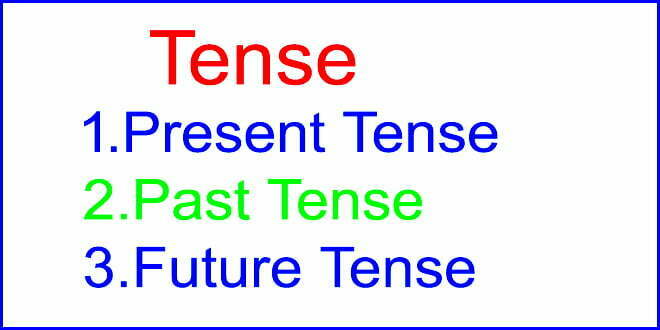Tense

Tense (কাল): Tense অর্থ কাল বা সময়। কোনো কাজ সম্পাদনের সময়কে tense বলে। ল্যাটিন শব্দ ‘tempus’ থেকে tense শব্দটি এসেছে। tempus অর্থ সময়।
Tense-এর প্রকারভেদ: Verb-এর কাজ অনুযায়ী tense প্রধানত তিন প্রকার। যথা:

১) Present tense (বর্তমান কাল)
২) Past tense (অতীত কাল)
৩) Future tense (ভবিষ্যৎ কাল)
১. Present tense (বর্তমান কাল): যে কাজ বর্তমান কালে সম্পন্ন হয় বা হয়ে থাকে বোঝায়, তাকে verb-এর present tense বা বর্তমান কাল বলে। যেমন: I go to school,
He writes a letter, He draws a picture.
২. Past tense (অতীত কাল): যে কাজ অতীতকালে সম্পন্ন হয়েছিল বা ঘটেছিল বোঝায়, তাকে verb-এর past tense বা অতীত কাল বলে।
যেমন: I went to school. He wrote a letter yesterday. He drew a picture.
৩. Future tense (ভবিষ্যৎ কাল): ভবিষ্যৎ কালে কোনো কাজ সম্পন্ন হবে বোঝালে, তাকে verb-এর future tense বা ভবিষ্যৎ কাল বলে।
যেমন: I shall buy a pen. I shall go to Dhaka.
They will play football etc.
প্রত্যেকটি tense-কে আবার চার ভাগে ভাগ করা যায়। যথা:
১) Indefinite (অনির্দিষ্ট)
২) Continuous (চলতি অবস্থা)
৩) Perfect (সম্পন্ন বা শেষ অবস্থা) ও
৪) Perfect continuous (পূর্ব থেকে আরম্ভ হয়ে চলতে থাকা)
Present tense (বর্তমান কাল)
১. Present indefinite tense: বর্তমান কালে কোনো কাজ সাধারণভাবে হয় বা হয়ে থাকে এরূপ বোঝালে verb-এর present indefinite tense হয়। চিরন্তন সত্য, নিকট ভবিষ্যৎ, অভ্যাস, প্রকৃতি বোঝাতেও present indefinite tense হয়।
গঠন প্রণালি: Subject-এর পর মূল verb-এর present form ব্যবহূত হয়। তবে subject (কর্তা) third person singular number হলে মূল verb-এর শেষে s বা es যোগ করতে হয়।
| Structure of present simple | ||
| positive | negative | question |
| I work in a bank.You work in a bank.We work in a bank.They work in a bank. | I don’t (do not) work.You don’t (do not) work.We don’t (do not) work.They don’t (do not) work. | Do I work in a bank?Do you work in a bank?Do we work in a bank?Do they work in a bank? |
| He works in a bank.She works in a bank.The bank opens at 9 o’clock. | He doesn’t (does not) work.She doesn’t (does not) work.It doesn’t (does not) open at 9 o’clock. | Does he work? Does she work? Does it open at 9 o’clock |
২. Present continuous tense: বর্তমান কালে কোনো কাজ হচ্ছে বা চলছে এরূপ বোঝালে verb-এর present continuous tense হয়।
গঠন প্রণালি: Subject-এর পর person ও number অনুসারে am, is, are বসে এবং মূল verb-এর শেষে ing যোগ হয়।
Here is how to form the present continuous tense in English.
| Structure of present continuous | ||
| positive | negative | question |
| I’m (I am) reading a book. You’re (you are) reading. We’re (we are) reading. They’re (they are) reading. | I’m (I am) not reading.You’re (you are) not reading.We’re (we are) not reading.They’re (they are) not reading. | Am I reading?Are you reading?Are we reading?Are they reading? |
| He’s (he is) reading a book.She’s (she is) reading a book.It’s (it is) raining. | He’s not / he isn’t (he is not) reading. She’s not / she isn’t (she is not) reading. It’s not / it isn’t (it is not) raining. | Is he reading? Is she reading? Is it raining? |
| Present continuous – common mistakes | ||
| Common mistakes | Correct version | Why? |
| They are still waiting for you. | to form a continuous tense we use be + -ing. | |
| Are they still waiting for you? | In questions the subject (they) and the auxiliary verb (be) change places. | |
| Are they still waiting for you? | ||
| Where are they waiting for you? | ||
| She isn’t watching TV. | To form the negative we put notafter the verb be (am not, is not = isn’t, are not = aren’t). | |
| I believe you. | Some verbs are not used in continuous tenses – these are called stative verbs (e.g.believe, come from, cost, depend, exist, feel, hate, like). |
Present tense (বর্তমান কাল)
Present perfect tense: বর্তমান কালে কোনো কাজ এই মাত্র শেষ হয়েছে কিন্তু তার ফল এখনো বর্তমান আছে, এরূপ বোঝালে verb-এর present perfect tense হয়।
গঠন প্রণালি: Subject-এর পর person ও number অনুসারে have বা has বসে এবং মূল verb-এর past participle form ব্যবহৃত হয়।
| Structure of present perfect simple | ||
| positive | negative | question |
| I’ve (I have) seen him.You’ve done it. We’ve been there. They’ve eaten it. | I haven’t (have not) seen him. You haven’t done it. We haven’t been there. They haven’t eaten it. | Have I seen him? Have you done it? Have we been there? Have they eaten it? |
| He’s (he has) gone.She’s (she has) finished.It’s (it has) gone. | He hasn’t (has not) gone.She hasn’t finished.It hasn’t gone. | Has he gone?Has she finished?Has it gone? |
| Present perfect simple – common mistakes | ||
| Common mistakes | Correct version | Why? |
| Steven has written a new book. | Steven has written a new book. | The past participle of the verb must be used – wrote is past simple, written is the past participle. |
| Have you seen him before? | The helping verb ‘have’ is used in the present perfect- it is inverted with the person (you have become have you). | |
| I haven’t seen him before. | The helping verb ‘have’ is used in the present perfect- to make it negative we simply add not(n’t). | |
| I have been here since last week. | The present perfect is used to show an action which continues to the present (an unfinished action). | |
| I’ve known him for 5 years. | Verbs such as know, want,like, etc. (stative verbs) suggest permanent states, not actions, so are used in the simple form, NOT the -ing form. |
Present perfect continuous tense: বর্তমান কালে কোনো কাজ পূর্ব থেকে আরম্ভ হয়ে এখনো হচ্ছে বা চলছে এরূপ বোঝালে verb-এর present perfect continuous tense হয়।
গঠন প্রণালি: Subject-এর পর person ও number অনুসারে have been বা has been বসে এবং মূল verb-এর শেষে ing যোগ হয়।
| Structure of present perfect continuous | ||
| positive | question | negative |
| I have (I’ve) been living here for two years.He has (he’s) been waiting for you. | Have you been living here for a long time?What has she been doing? | I have not (haven’t) been waiting for long.He has not (hasn’t) been working. |
| Present perfect continuous – common mistakes | ||
| Common mistakes | Correct version | Why? |
| It has been raining heavily all day. | The structure of the present perfect continuous is have/has been -ing. | |
| I have been sitting here for two hours. | Verbs such as sit, wait, speak, etc. (non-stative verbs) suggest continuity and so are mostly used in the continuous (-ing) form. | |
| Which?I have worked here for five years. I have been working here for five years. | When BOTH the simple and continuous forms are possible, native speakers prefer to use the continuous. |
ast tense (অতীত কাল)
১. Past indefinite tense: অতীত কালে কোনো কাজ সাধারণভাবে হয়েছিল এরূপ বোঝালে verb-এর past indefinite tense হয়।
গঠন প্রণালি: Subject-এর পর মূল verb-এর past form ব্যবহৃত হয়।
Here is how to form the past simple tense in English.
| Structure of past simple | ||
| positive | negative | question |
| I arrived yesterday.You arrived yesterday.He/she/it arrived.We arrived.They arrived. | I didn’t (did not) arrive.You didn’t (did not) arrive.He/she/it didn’t arrive.We didn’t arrive.They didn’t arrive. | Did I arrive yesterday?Did you arrive?Did he/she/it arrive?Did we arrive?Did they arrive? |
| Past simple – common mistakes | ||
| Common mistakes | Correct version | Why? |
| I was working in London. | I worked in London. | In positive sentences, a helping verb such as ‘was’ or ‘did’ is not used. |
| Did he work in London? | The helping verb ‘did’ is used in past simple questions. | |
| Worked in London? | Did he work in London? | The helping verb ‘did’ is used in past simple questions. |
| Did he write a letter? | The main verb is used in the infinitive form in questions and negatives. | |
| He didn’t write a letter. | The main verb is used in the infinitive form in questions and negatives.রি |
Past continuous tense: অতীত কালে কোনো কাজ হচ্ছিল বা চলছিল এরূপ বোঝালে verb-এর past continuous tense হয়।
গঠন প্রণালি: Subject-এর পর person ও number অনুসারে was বা were বসে এবং মূল verb-এর শেষে ing যোগ হয়।
Here is how to form the past continuous in English.
| Structure of past continuous | ||
| positive | negative | question |
| I was reading a book. He/she was talking. It was raining. | I wasn’t (was not) reading.He/she wasn’t talking. It wasn’t raining. | Was I reading? Was he/she talking? Was it raining? |
| You were reading a book. We were waiting. They were drinking. | You weren’t (were not) reading. We weren’t talking. They weren’t drinking. | Were you reading?Were we waiting?Were they drinking? |
| Past continuous – common mistakes | ||
| Common mistakes | Correct version | Why? |
| I was waiting for him for almost two hours. | To form the past continuous we use was/were + ing. | |
| What was he doing when you saw him? | ||
| We played tennis every morning. | We use the past simple for repeated actions in the past. | |
| They were watching TV when I came. | We use the past continuous when we want to say what was happening (what was in progress) at a particular time in the past. |
Past perfect tense: অতীত কালে সংঘটিত দুটি কাজের মধ্যে পূর্বে সংঘটিত কাজটির verb-এর past perfect tense হয় এবং পরে সংঘটিত কাজটির verb-এর past indefinite tense হয়।
গঠন প্রণালি: Subject-এর পর had বসে এবং মূল verb-এর past participle form ব্যবহৃত হয়।
| Structure of past perfect simple | ||
| positive | negative | question |
| I’d (I had) seen him.You’d done it. We’d been there. They’d eaten it. | I hadn’t (had not) seen him. You hadn’t done it. We hadn’t been there. They hadn’t eaten it. | Have I seen him? Have you seen her? Had we finished it? Had they been there? |
| He’d (he had) gone.She’d (she had) gone.It’d (it had) gone. | He hadn’t (had not) gone.She hadn’t gone.It hadn’t gone. | Had he been here?Has she finished?Has it gone? |
| Past perfect simple – common mistakes | ||
| Common mistakes | Correct version | Why? |
| I hadn’t been to London. | The helping verb had (negative –hadn’t) is used in the past perfect. | |
| When I saw him I noticed that he had had a haircut. | The action (haircut) which happened before another past action must be put into the past perfect to make the time order clear to the listener. | |
| He told me he had been to London. | His original words were: ”I have been to London.” However, in reported speech we move the tense back – the present perfect (have been) becomes past perfect (had been). |
৪. Past perfect continuous tense: অতীত কালে সংঘটিত দুটি কাজের মধ্যে পূর্বে সংঘটিত কাজটি কিছু সময় যাবত চলছিল এরূপ বোঝালে verb-এর past perfect continuous tense হয়।
গঠন প্রণালি: Subject-এর পর had been বসে এবং মূল verb-এর শেষে ing যোগ হয়।
| Structure of past perfect continuous | ||
| positive | question | negative |
| I had (I’d) been waiting.You had (you’d) been cooking.He/she/it had been eating.We had (we’d) been waiting.They had (they’d) been playing. | Had I been waiting?Have you been working?Had he/she/it been waiting?Had we been eating?Had they been talking? | I hadn’t (had not) been waiting.You hadn’t been waitingHe/she/it hadn’t been waiting.We hadn’t been working.They hadn’t been working. |
| Past perfect continuous – common mistakes | ||
| Common mistakes | Correct version | Why? |
| I had been working hard, so I felt very tired. | The form of the past perfect continuous is had + been + verb-ing. | |
| I had heard the song many times before. | Some verbs are not normally used in the continuous form, e.g. stative verbs such as asknow, like, understand, believe,hear, etc. |
Future tense (ভবিষ্যৎ কাল)
Future indefinite tense: ভবিষ্যৎ কালে কোন কাজ সাধারণভাবে সংঘটিত হবে এরূপ বোঝালে verb-এর future indefinite tense হয়।
গঠন প্রণালি: Subject-এর পর person ও number অনুসারে shall বা will বসে এবং মূল verb-এর present form ব্যবহৃত হয়।
যেমন:
1) I shall go to Sylhet.
2) He will buy a book.
3) He will not learn English.
4) Will you play football?
| Structure of future simple | ||
| statement | negative | question |
| I will (I’ll) be there tomorrow.You will (you’ll) be there.He/she/it will (he’ll) be there.We will (we’ll) be there.They will (they’ll) be there. | I won’t (will not) be there. You won’t be there. He/she/it won’t be there. We won’t be there. They won’t be there. | Will I be there tomorrow? Will you be there?Will he/she/it be there?Will we be there?Will they be there? |
| Future simple – common mistakes | ||
| Common mistakes | Correct version | Why? |
| – The phone’s ringing.- | Ok – I’ll answer it. | If the action is decided at the moment of speaking, we use ‘will’ / ‘will not’. |
| I’m sure he will help you. | When we say what we think or expect, we use ‘will’. | |
| I probably won’t be there.I’ll probably be there. | The adverbs ‘definitely’ and ‘probably’ come before ‘won’t’ but after ‘will’. | |
| I promise I’ll help. | After ‘promise’ we usually use ‘will’, not the ‘going to’ future. | |
| I’ll call you when I come to my office. | When we refer to the future in adverbial clauses, we normally use the present simple (after ‘when’, ‘as soon as’ and ‘until’). | |
| If you give me your address, I’ll send you a postcard. | When we refer to the future in conditional clauses, we normally use the present simple. | |
| I can’t see you next week. I am returning/am going to return to Paris. | To show that the decision was made in the past, we use the present continuous or the ‘going to’ future. |
Future continuous tense: ভবিষ্যৎ কালে কোনো কাজ কিছু সময় ধরে হতে থাকবে বা চলতে থাকবে বোঝালে verb-এর future continuous tense হয়।
গঠন প্রণালি: Subject-এর পর person ও number অনুসারে shall be বা will be বসে এবং মূল verb-এর শেষে ing যোগ হয়। যেমন:
| Structure of future continuous | ||
| I will (I’ll) be waiting there at five o’clock.You will (I’ll) be waiting.He/she/it will (he’ll) be waiting.We will (we’ll) be waiting.They will (they’ll) be waiting. | I will not (won’t) be waiting.You will not be waiting.He/she/it will not be waiting.We will not be waiting.They will not be waiting. | Will I be waiting there? Will you be waiting? Will he/she/it be waiting? Will we be waiting? Will they be waiting? |
৩. Future perfect tense: ভবিষ্যৎ কালে সংঘটিত দুটি কাজের মধ্যে অপেক্ষাকৃত পূর্বে সংঘটিত কাজটির verb-এর future perfect Tense হয় এবং পরে সংঘটিত কাজটির verb-এর Present/future indefinite tense হয়।
গঠন প্রণালি: Subject-এর পর person ও number অনুসারে shall have বা will have বসে এবং মূল verb-এর past participle form ব্যবহৃত হয়।
| Structure of future perfect (simple) | ||
| positive | negative | question |
| The film will have started by the time we get there. | The film will not (won’t) have started by the time we get there. | Will the film have started by the time we get there? |
| Future perfect simple – common mistakes | ||
| Common mistakes | Correct version | Why? |
| The film will already have started by the time we get home. | The form of the future perfect is will + have + past participle. | |
| Will you have finished it by the time I come back? | The structure for questions is: will + subject + have + past participle. |
যেমন:
1) I shall have done the sum before I go to school.
2) She will have done the work by this time.
3) They will have reached home before the rain sets in.
4) I shall have finished the work before father comes.
Future perfect continuous tense: ভবিষ্যৎ কালে সংঘটিত দুটি কাজের মধ্যে একটি কাজ অপর কাজটি শুরু হওয়ার পূর্ব পর্যন্ত কিছুকাল ধরে চলতে থাকবে বোঝালে পূর্ববর্তী কাজটি future perfect continuous tense হয় এবং পরবর্তী কাজটি Present/future indefinite tense হয়।
গঠন প্রণালি: Subject-এর পর shall have been বা will have been বসে এবং মূল verb-এর শেষে ing যোগ হয়।
| Structure of future perfect continuous | ||
| positive | negative | question |
| Next year I’ll (I will) have been working in the company for 10 years. | I won’t (will not) have been working in the company for 10 years. | Will you have been working in the company for 10 years? |
| Future perfect continuous – common mistakes | ||
| Common mistakes | Correct version | Why? |
| I will have been working in the company for five years next month. | The form of the future perfect continuous is will + have + been + past participle. | |
| I will not (won’t) have been working in the company for five years next month. | The form of the negative is will not + have + been + past participle. | |
| Will you have been working in the company for five years next month? | The form of the question is will + subject + have + been + past participle. | |
| I’ll have worked in three different positions at the company by the end of the year. | We use the simple form when we talk about an amount or number. |
যেমন:
1) I shall have been doing the sum before he arrives.
2) She will take a rest after she has been walking for two hours.
3) They will have been playing before the sun sets.
4) I shall have been sleeping before the sun rises.




